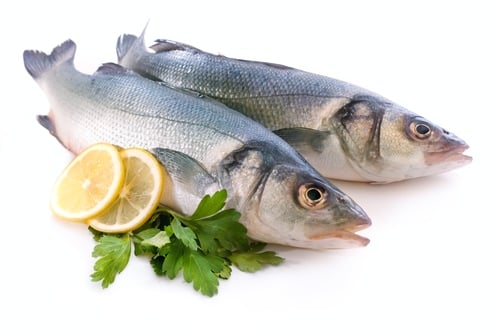Does Fish Belong in a Gout Diet?
You often read on other websites that if you suffer from gout you should avoid eating fish since it is considered high in purines. In this post we will examine this issue and take a closer look and see if fish does belong in a gout diet. First of all fish has been consumed by humans for thousands of years and is we all know it is very healthy for you. Let’s see some of the health benefits that fish provides.
Fish is loaded with nutrients and is considered on the healthiest foods in the world. It is high in protein, vitamin D and is considered the best source for omega-3 fatty acids which is linked to reducing the risk of developing many diseases.
Omega-3 fatty acids also helps keep your brain working well reducing the risk of developing dementia or Alzheimer’s. Many studies prove that if you eat fish on a weekly basis, you will experience a slower rate of cognitive decline.
Fish also is good for the heart, in fact it is considered one of the best foods to eat in order to have a healthy heart. Again many studies prove that eating fish regularly is good for the heart in order to avoid a heart attack or stroke. Gout sufferers should take note since we are at a higher risk of developing a heart attack or stroke.
Did you know that fish is also high in vitamin D? A single 4 ounce serving of cooked salmon (which is one my favorites) contains 100% of recommended intake of vitamin D. For more information on important vitamin D is to gout sufferers make sure to read my post titled “Gout and Vitamin D”.
There is also some evidence showing that fish may lower the risk of developing rheumatoid arthritis which is closely related to gout. In addition, fish is very good for your eyes. A study has shown that eating fish just once per week can decrease the risk of developing the disease called macular degeneration by 53%! Fish is also helpful in controlling insulin levels in the body which may decrease the risk of developing diabetes.
A 2019 study published in Arthritis & Rheumatology followed 724 gout patients from 2003 and 2012 to see if there is any correlation between fish consumption and gout flares. They found that those patients who ate fatty fish as in salmon, herring, mackerel for example decreased their risk of gout flares by 33%!
As you see fish has so many health benefits that I can’t even list them all. So why would you want to avoid such a healthy food cause some idiot told you it’s high in purines and should be avoided? Obviously if you suffer from gout, you know eating too much protein may harm you and fish is high in protein but you still need to eat protein.
To enjoy fish all you have to do is make sure that you eat my recommended portion of 4 ounces and you’ll be just fine. If you have fish for lunch don’t be going and eating a steak for supper cause that is too much protein for a gout sufferer to handle.
Choose one day to eat either a nice cut of meat or fish. Don’t be a glutton eating fish at every meal but eat wisely as I have taught you in this website and my ebook. Meaning eat fish in moderation, although it is high in purines, you can’t afford to skip on it since it offers so many other health benefits for you.
Now which fish should you eat?
A gout sufferer should avoid seafood, shrimp, lobster and other shellfish which may raise uric acid and is simply not healthy for you. See my post on seafood to learn more. What you want to do is eat fish with scales and only eat these types of fish. Nothing else.
You can eat salmon, sole, tuna, catfish, red snapper, tilapia, flounder, whitefish, haddock and so many other fish. These fish have anywhere between 50 to 150 milligrams of purines for every 100 grams. Nothing to worry about, believe me!
There are fish that are higher on the purine scale like anchovies, sardines, mackerel and herring, octopus which you should limit since they are over 150 milligrams of purines for every 100 grams.
Whatever you do do not eat fish that comes from a can like canned sardines or herring with added oils. Always eat your fish fresh. Do not deep-fry your fish, instead either grill it or simply bake it in the oven.
I season my fish with fresh herbs, freshly squeezed lemon juice and some extra virgin olive oil. You don’t need more than that. Try and avoid high sodium seasoning mixes or fish sauces high in sugar.
A few words about fish oil
Purines are found in the meat of the fish but not in distilled fish oil. If you wish to supplement EPA or DHA which are two fatty acids found in fish, then buy only pharmaceutical-grade molecularly distilled fish oil supplements. Some fish oils are also very high in vitamin D, providing you with 200% of the recommended daily intake.
Before buying make sure to research what you are getting by checking out the provider’s website, checking reviews online and checking product labels properly. Before purchasing any fish oil make sure to speak to your doctor about it so it doesn’t affect any other medications you may be taking.
Some gout sufferers claim that fish oil may fight gout flares since it is a powerful anti-inflammatory. Regardless, anything that has omega-3 fatty acid is good for gout as explained in other posts on this website as well.
In conclusion, you often hear health experts or dieticians say “you should only eat fish no more than two times a week”. Why? Fish is the healthiest meat, healthier than beef, lamb and chicken. If you like fish, you can eat it every day but make sure it is the only meat you eat that day since gout sufferers should not eat more than 4 ounces of meat in any given day to avoid higher uric acid levels in the bloodstream.
As for mercury in the fish, it depends in which part of the world you are located in. I recommend you buy organic fish and make sure it is always labeled as “wild caught” instead of “farmed”.
Like fishing? Here in North America we have plenty of clean lakes where you can fish from and enjoy some good quality fish. I’m kinda getting hungry and think I might just go and prepare myself some Pacific salmon that I bought the other day. To your health!

